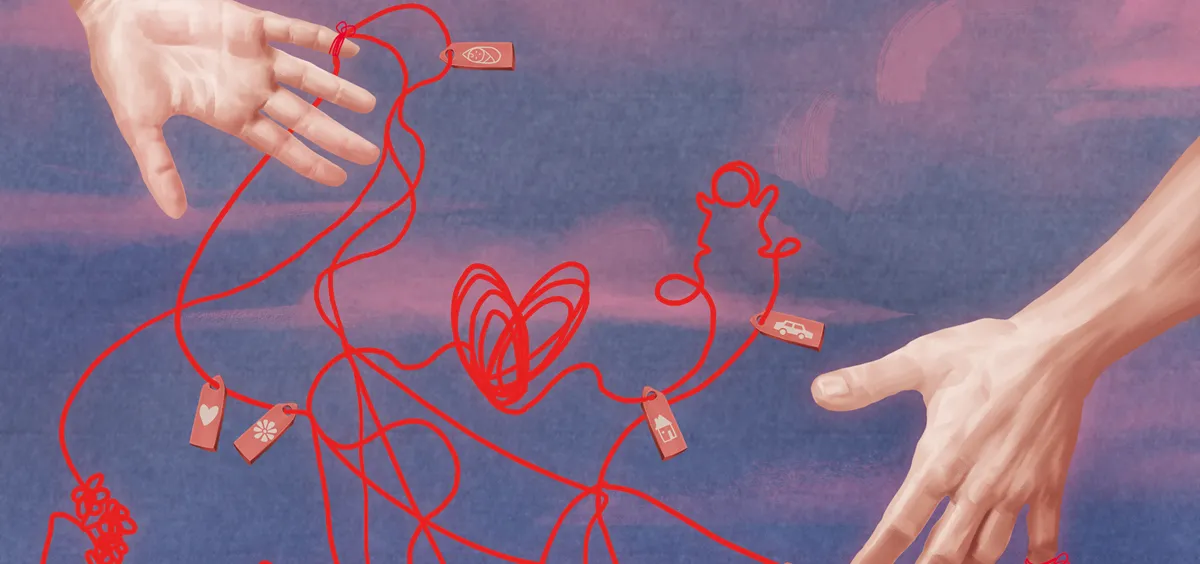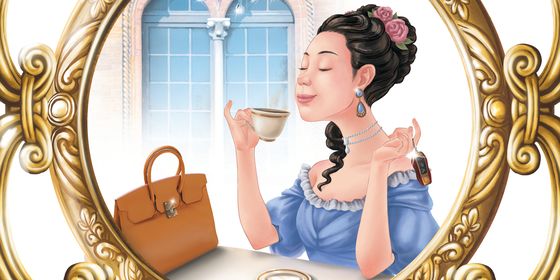How to navigate China’s blind date scene
“Start a family before you start an enterprise (成家立业 chéngjiā-lìyè),” warns an old Chinese idiom. But with the country’s singles population now reaching over 200 million according to national census data, this could seem like an impossible dream.
While the social and family pressure to get married is still strong, many young Chinese now pursue fast paced, stressful careers that cut severely into their social life. In a survey conducted earlier this year by Zhenai, an online matchmaking service, young singles born after 1995 cited having a limited social circle, being “homebodies (宅 zhái),” and being busy at work as the top reasons why they are still unattached. At the same time, 70 percent of those surveyed expressed a desire to get married.
Under these dire circumstances, 相亲 (xiāngqīn), or blind dates usually arranged by one’s family members or friends, are a practical solution for modern singles unable to find love on their own. Though some young people agree to xiangqin just to get their parents off their backs, others are seriously invested in finding a life partner the traditional way.
Scoping the field
In a traditional Chinese marriage, the couple’s families must have matching social status, or 门当户对 (méndāng-hùduì). In modern matchmaking terms, the focus tends to fall on the individual partner’s 条件 (tiáojiàn, conditions), a series of measurable, supposedly objective factors including height, age, education level, job, financial situation, and, yes, family resources. In Hangzhou, a particularly creative couple advertising for a bride for their son stipulated that she must have a “key performance indicator” above 3.75 at work.
Historically, when arranged marriages were prevalent, xiangqin, where the two potential spouses and their families met face-to-face, was the final step of a betrothal after all the conditions had been vetted through a matchmaker and found satisfactory. During the Southern Song dynasty (1127 – 1279), a typical xiangqin event involved the man visiting the woman’s family with wine and gifts. If both parties approved the match, the man would insert a gold hairpin into the woman’s hair. If not, he would give her family two rolls of silk in compensation and they would go their separate ways.
Matchmakers, or 媒人 (méiren), still exist today, but are more commonly referred as 介绍人 (jièshàorén). They can be your nosy aunts, busybody neighbors, your parents’ mah-jong buddies who are convinced their former colleague’s son would make you a good match—or actual professionals. Like all good salespeople, they will always depict your potential date in a positive light, and it’s your responsibility to interpret what the facts may be:
You should go and meet this guy. He is an honest person and very self-motivated.
Nǐ jiù qù jiàn yí jiàn ba, xiǎohuǒzi shì gè lǎoshirén, hěn yǒu shàngjìnxīn.
你就去见一见吧,小伙子是个老实人,很有上进心。
Honest and self-motivated sound like great qualities for a partner to have. Unfortunately, in the modern matchmaking world, these adjectives are so clichéd that they are considered euphemisms to mask a person’s precarious finances—after all, if they were rolling in it, you’d expect Aunt Wang to lead with that information:
This guy’s family is well off, but he’s a bit fond of playing around. I’m sure he’ll settle down after marriage.
Xiǎohuǒzi jiāli tiáojiàn hǎo, jiùshì àiwánr. Jiéhūn shōushōu xīn jiù hǎo le.
小伙子家里条件好,就是爱玩儿。结婚收收心就好了。
This sounds like a playboy with no job, but this probably won’t matter to many older relatives who still consider financial status and traditional gender roles to be the foundations of marriage, creating a generation gap (代沟 dàigōu) with the young people whom they are trying to set up:
This young woman is very filial. She has been obedient to her parents since she was little.
Zhè nǚhái tèbié xiàoshùn, cóngxiǎo jiù tīng bàmā de huà.
这女孩特别孝顺,从小就听爸妈的话。
In this day and age, it’s slightly alarming to hear an adult described in this way. This young woman may have a completely different personality than what she shows her family—or maybe, she really is that obedient, and you can expect your new in-laws to try to dictate every aspect of your married life including how many children you have and what floor you live on.
Laying out the terms
A blind date is often not-so-blind, since the two parties might exchange photos beforehand. Due to the awkwardness of making conversation, many blind dates start off with remarks about each other’s looks:
You are more beautiful/handsome/spirited in person.
Nǐ bǐ zhàopiàn shàng hái piàoliang/shuàiqi/jīngshen.
你比照片上还漂亮/帅气/精神。
However, there are also people who dispense with the niceties and treat the date like the business transaction it is. They will often start by saying they want to 开门见山 (āimén-jiànshān, “open the door to see the mountain,” be direct) and get right down to the 条件. This is known as 查户口式聊天 (cháhùkǒu shì liáotiān), or “household census-style conversation”:
A: You were introduced by Aunt Wang, right?
Nǐ shì Wáng āyí jièshào de ba?
你是王阿姨介绍的吧?
B: That’s right. Hello.
Méi cuò, nǐ hǎo.
没错,你好。
A: Let’s not beat about the bush. Where did you graduate from?
Wǒmen jiù kāimén-jiànshān ba. Nǐ shì nǎlǐ bìyè de?
我们就开门见山吧。你是哪里毕业的?
A: What is your job?
Nǐ shì zuò shénme gōngzuò de ya?
你是做什么工作的呀?
A: What do your parents do?
Nǐ fùmǔ shì zuò shénme de ya?
你父母是做什么的呀?
For some women, the deal-breaker is: 你有房吗?(Nǐ yǒu fáng ma? Do you own an apartment?), as owning real estate is a traditional prerequisite for males getting married. As one viral online blog post offering blind date tips suggests, there are a number of indirect ways to figure out the other party’s financial situation without appearing rude:
A: The parking fee is very expensive in my area, almost equal to the apartment’s rent. What about your place?
Wǒ zhù zhèbiān chēwèi tèbié guì, dōu kuài gǎnshàng fángzū le, nǐ nàbiān zěnmeyàng a?
我住这边车位特别贵,都快赶上房租了,你那边怎么样啊?
From the answer to this question, you can supposedly work out numerous details such as whether the other person lives in an expensive apartment complex, owns the apartment or rents, or owns a car. Asking about the other person’s hobbies and expenses is supposed to achieve the same effect:
What do you like to do in your spare time?
Xiūxí de shíhou, nǐ xǐhuan zuò shénme?
休息的时候,你喜欢做什么?
There are, of course, plenty of people who do not care about the material advantages of their date, who might say:
A: I think it doesn’t matter if you don’t own an apartment. Self-motivation and a sense of responsibility are the most important.
Wǒ juéde méiyǒu fángzi yě méi guānxì. Yǒu shàngjìnxīn、zérènxīn shì zuì zhòngyào de.
我觉得没有房子也没关系。有上进心、责任心是最重要的。
B: That’s great. I think you are fantastic.
Tài hǎo le, wǒ juéde nǐ yě tǐnghǎo de.
太好了,我觉得你也挺好的。
Making a decision
A cynical online joke continues the above exchange, with this non-sequitur:
A: What is your favorite color?
Nǐ zuì xǐhuan de yánsè shì shénme?
你最喜欢的颜色是什么?
B: I like blue.
Wǒ zuì xǐhuan lánsè.
我最喜欢蓝色。
A: I like red. I’m sorry, we are not compatible.
Wǒ zuì xǐhuan hóngsè. Duìbuqǐ, wǒmen bù héshì.
我最喜欢红色。对不起,我们不合适。
The joke is that the woman doesn’t want to admit she cares about the apartment, so she invents an excuse to end the date. Humor aside, another way to avoid the “census chat” is to give one’s own information first. This is also an opportunity to lay out one’s plans for life:
I have a stable job and plan to buy an apartment in five years.
Wǒ yǒu yí fèn wěndìng de gōngzuò, dǎsuàn zài wǔ nián zhīnèi mǎifáng.
我有一份稳定的工作,打算在五年之内买房。
When all the right boxes are checked, it can also feel too good to be true. That’s when they ask:
You have great conditions. Why are you still single?
Nǐ gè fāngmiàn tiáojiàn dōu tǐnghǎo de, wèishéme hái dānshēn ne?
你各方面条件都挺好的,为什么还单身呢?
A common answer to this is:
I was too busy to have a relationship, but now, I’ve reached the age where I feel like I should start a family.
Wǒ zhīqián gōngzuò tài máng, jiù méi tán. Xiànzài niánjì yě dào le, gāi chéngjiā le.
我之前工作太忙,就没谈。现在年纪也到了,该成家了。
A slightly more romantic response might be:
Because I haven’t met the right person yet.
Yīnwèi wǒ hái méiyǒu yùdào duì de rén.
因为我还没有遇到对的人。
Looking forward
At the end of a blind date, each party may have already made up their mind about whether to pursue a relationship, but rarely commit to anything.
Let’s get in touch later.
Nà wǒmen zhīhòu zài liánxì ba.
那我们之后再联系吧。
Let’s go out sometime!
Yǒu jīhuì yìqǐ chūqù wánr!
有机会一起出去玩儿!
These parting words sound nice enough, but without concrete plans, they are just polite cues that you won’t see each other again. Navigating China’s blind dating scene sounds like a lot of work, but the good news is that views on romance and marriage are changing fast for the younger generation. Many would like to find a life partner, but are also happy to wait for the right person. In the meantime, they cheerfully declare:
Being single is not a crime; long live freedom!
Dānshēn wú zuì, zìyóu wànsuì!
单身无罪,自由万岁!
“Blind Date” is a story from our issue, “Disaster Warning”. To read the entire issue, become a subscriber and receive the full magazine. Alternatively, you can purchase the digital version from the iTunes Store.












